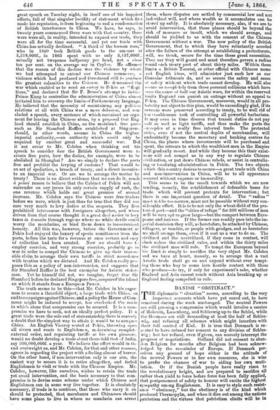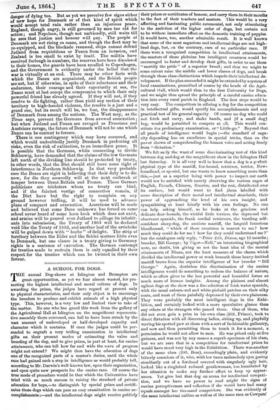DANISH "OBSTINACY."
THE diplomatic "situation" seems, according to the very impertect accounts which have yet oozed out, to have remained during the week unchanged. The neutral Powers ale still pressing a compromise which would involve a cession of Holstein, Lauenburg, and Schleswig up to the Schlei, while the Gem mans am still demanding at least the half of Sables- wig, and refusing all schemes which might interfere with their control of Kiel. It is true that Denmark is re- ported to have refused her consent to any division of Schles- wig; but her refusal, even if given, can scarcely interrupt the progress of negotiations. Holland did not consent to aban- don Belgium for months after Belgium had been acknow- ledged by the remainder of Europe. If Denmark per- ceives any ground of hope either in the attitude .of the neutral Powers or in her own resources, she is wise to prefer the chances of war to aiding her own muti- lation. Or if the Danish people have really risen to the revolutionary height, and are prepared to sacrifice. all rather than yield to force before force has been fully applied, that postponement of safety to honour will excite the highest sympathy among Englishmen. It is easy to style such resist- ance "obstinacy," but the obstinacy is of the kind which produced Thermopylae, and' when it dies out among the nations patriotism and the virtues that patriotism elicits will be in danger of dying too. But as yet we perceive few signs either of new hope for Denmark or of that kind of spirit which would accept total ruin rather than an injurious peace. England, though angry, is still governed by men too old for action; and Napoleon, though not unfriendly, still waits till he sees that justice and honour will pay. The people of Denmark are not rising en masse, and though the fleet may be re-equipped, and the blockade resumed, ships cannot defend Jutland from requisitions or Funen from an invasion, and Zealand is too small to exist by itself. The militia have received furlough in numbers, the reserves have been dismissed to their homes, the guards have been recalled to Copenhagen, and the Government is evidently under the belief that the war is virtually at an end. There may be other facts with which the Danes are acquainted, and the British people are not, but if otherwise, in spite of their reluctance and their endurance, their courage and their superiority at sea, the Danes must at last accept the compromise to which their only powerful friend has already agreed. If they will not, if they resolve to die fighting, rather than yield any section of their territory to high-handed violence, the resolve is a just and a grand one, but its result will be, we fear, the disappearance of Denmark from among the nations. The West may, as the Times says, prevent the Germans from avowed annexation ; but when Jutland and Funen are ravaged as Prussians and Austrians ravage, the future of Denmark will not be one which Danes can be content to foresee.
There is one contingency which may have occurred, and which would undoubtedly justify Denmark in preferring all risks, even the risk of extinction, to an immediate peace. It is possible that the Germans, while consenting to divide Schleswig, have demanded that the claims of the few Germafts left north of the dividing line should be protected by treaty, in other words, that the Diet should still have some right of interference in Northern Schleswig. In that very probable case the Danes are right in believing that their duty is to die now, for die they assuredly will at the next outbreak of temper between Great Britain and France. These German politicians are tricksters whom no treaty can bind, and if the faintest vestige of connection remain, if the Diet have but the right to complain on any ground however trifling, it will be used to advance plans of conquest and annexation. Assertions will be made and believed that some Dane unknown has forced on some school never heard of some horn- book which does not exist, and armies will be poured over Jutland to pillage its inhabit- ants into submission, the Treaty of 1864 will be declared void like the Treaty of 1852, and another leaf of the artichoke will be gulped down with " hochs " of delight. The strip of territory between the Eider and the Schlei matters little even to Denmark, but one clause in a treaty giving to Germany rights is a sentence of execution. The German contempt for treaties made to restrain them is only equalled by their respect for the treaties which can be twisted in their own favour.































 Previous page
Previous page